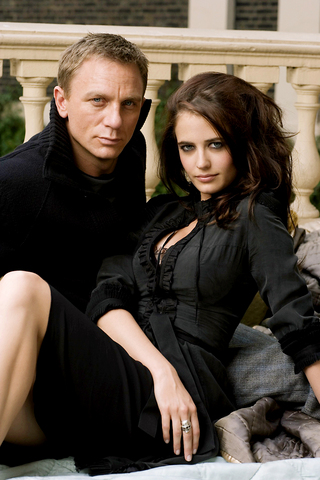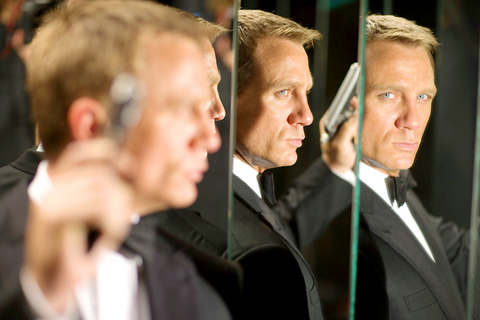Imagine, if you can, you've never heard of someone named James Bond. That martinis shaken or stirred meant nothing to you. That the number 007 made no particular sense and M was just a letter in the alphabet.
Imagine you've never experienced the Wow Factor. The stunts, the exotic locales, the gorgeous women, the despicable bad guys.
And then, at a multiplex near you, there appears a galvanizing new action hero — though you're not quite sure he should be counted as entirely heroic. And he's played by sexy Daniel Craig, an English actor whose name you may not know but whose charisma and extraordinary acting chops have drifted stateside in movies including Layer Cake, Road to Perdition, Munich and Infamous (as killer Perry Smith).

PHOTOS COURTESY OF SONY
Welcome to Casino Royale.
Based on Ian Fleming's first Bond novel — an earlier version in 1967 was made as a spoof starring David Niven and Woody Allen — the new 007 movie could be considered a re-imagining of the most famous spy in movie history. Or perhaps simply a kind of "Bond Begins."
Gone are the puerile double-entendres — funny when Sean Connery first uttered them more than 40 years ago, but a little tired now. Also MIA are the gyrating girls over the opening credits and, for that matter, the traditionally spectacular special-effects-in-the-extreme pre-credit prologue.

This Bond means business, and to make sure you know it, the picture opens with a black-and-white sequence in which Bond earns his double-0 status — that's two kills, if you please. First is a bloody bashing in a white-tiled public lavatory that's as unglamorous as a Martin Scorsese gang hit. The next one is, as our blond (get used to it) Bond notes, easier. Considerably.
Let the iconography begin. The familiar iris shot encircles him, the classic chords ring out, the movie bursts into color — and we're off and running with a Bond film worthy of, well, Sean Connery.
As always, the plot doesn't stand up to much scrutiny. A no-good named Le Chiffre (Mads Mikkelsen) makes a living financing terrorists. Certain bad bets on the stock market bring him to a high-stakes poker game in Montenegro. The inimitable M (inimitable Judi Dench) — who so far has dismissed her newest double-0 as nothing more than "a blunt instrument" — dispatches Bond to beat Le Chiffre at his own game, on and off the gaming table.

Director Martin Campbell, who gave us the very respectable GoldenEye in 1995, and writers Neal Purvis and Robert Wade, whose script has been sweetened by Crash's Oscar-winning Paul Haggis, approach the essential Bond tropes much as Peter Jackson did the special effects in his The Lord of the Rings trilogy. That is, in service of plot and character. We learn how Bond acquired that spiffy Aston Martin (in a card game). How he came by his first tailored tux, thanks to M-dispatched chaperone/love interest Vesper Lynd (gorgeous and talented Eva Green). And, in the crowd-pleasing moment of a crowd-pleasing movie, what he said the first time he was asked if he liked his martini shaken or stirred. To wit: "Do I look like I give a damn?"
Casino Royale does just about everything right. A breathtaking chase over, under, around and through a construction site includes some fancy stuff on a gigantic crane worthy of Jackie Chan at his most agile and death-defying. (Another plus: The movie relies more on stunt men than special effects.) The extravagantly beautiful Green makes for an expert sparring partner. Told she's not his type, she flippantly asks, "Smart?"
No, he replies. "Single."
Die-hard fans may miss Q and Miss Money-penny or the boys-and-their-toys gadgets or even the smirky tone. But in their stead is a riveting picture that, for all its globe-trotting glamour and eye-popping action, demands we take this new Bond seriously.
And why not? Craig is definitely the Real Thing — dangerous, seductive, with a wired intensity that, along with his irradiated blue eyes, calls to mind Connery's sex-symbol contemporary, Steve McQueen. Roger Moore was — let's face it — a charming buffoon. Timothy Dalton brought back the menace, but was never comfortable in the role. Pierce Brosnan brought back the humor, but was ultimately too comfortable in the role.
They all — with the possible exception of Moore, who sauntered through his films as if he were hosting a James Bond Film Festival, not playing the title role — worked in Connery's shadow. Craig doesn't replace the first, once-and-forever 007, but he brings a ferocity and sinewy sexiness to the part (he's naked more than Green is, most memorably in an already much talked about torture scene) that's totally new, totally right and yet takes nothing away from Bond No. 1.
OK, the movie is about 20 minutes too long. And we're not always sure who is doing what to whom or why. (Luckily, M explains all.)
Still, Craig and company have aired out 007, buffed him up and taught an old horndog some new tricks. As Vesper says to Bond, "Just because you've done something doesn't mean you have to keep on doing it."
Daniel Craig does Bond differently. He does him better. And I hope he does him for a good long time.

In the March 9 edition of the Taipei Times a piece by Ninon Godefroy ran with the headine “The quiet, gentle rhythm of Taiwan.” It started with the line “Taiwan is a small, humble place. There is no Eiffel Tower, no pyramids — no singular attraction that draws the world’s attention.” I laughed out loud at that. This was out of no disrespect for the author or the piece, which made some interesting analogies and good points about how both Din Tai Fung’s and Taiwan Semiconductor Manufacturing Co’s (TSMC, 台積電) meticulous attention to detail and quality are not quite up to

April 21 to April 27 Hsieh Er’s (謝娥) political fortunes were rising fast after she got out of jail and joined the Chinese Nationalist Party (KMT) in December 1945. Not only did she hold key positions in various committees, she was elected the only woman on the Taipei City Council and headed to Nanjing in 1946 as the sole Taiwanese female representative to the National Constituent Assembly. With the support of first lady Soong May-ling (宋美齡), she started the Taipei Women’s Association and Taiwan Provincial Women’s Association, where she

Chinese Nationalist Party (KMT) Chairman Eric Chu (朱立倫) hatched a bold plan to charge forward and seize the initiative when he held a protest in front of the Taipei City Prosecutors’ Office. Though risky, because illegal, its success would help tackle at least six problems facing both himself and the KMT. What he did not see coming was Taipei Mayor Chiang Wan-an (將萬安) tripping him up out of the gate. In spite of Chu being the most consequential and successful KMT chairman since the early 2010s — arguably saving the party from financial ruin and restoring its electoral viability —

It is one of the more remarkable facts of Taiwan history that it was never occupied or claimed by any of the numerous kingdoms of southern China — Han or otherwise — that lay just across the water from it. None of their brilliant ministers ever discovered that Taiwan was a “core interest” of the state whose annexation was “inevitable.” As Paul Kua notes in an excellent monograph laying out how the Portuguese gave Taiwan the name “Formosa,” the first Europeans to express an interest in occupying Taiwan were the Spanish. Tonio Andrade in his seminal work, How Taiwan Became Chinese,